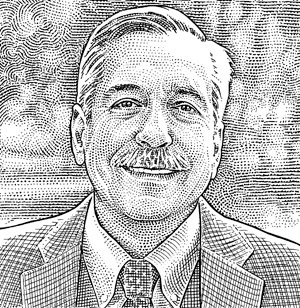Bob Allen ’73 Touches the Community in Philadelphia
By Matt Sinclair ’90
“FOR ME, the real impetus for going into public service was wanting to do something where I could hold my head high,” says Bob Allen ’73, director of property and concessions management for Philadelphia’s Fairmount Park. “I needed to feel I was doing something that was of benefit to more people.”
 A history graduate who holds an MBA from Temple University, Allen brings the spirit of a volunteer to his work — with good reason. After leaving his position as head of commercial banking for a bank in Philadelphia because he found the job unsatisfying, he found himself itching for activity and routine. He called a former colleague who was executive director of Fairmount Park — a citywide, 9,200-acre system of 62 parks — and asked if he could volunteer. That led to a position as an assistant managing director in the City of Philadelphia.
A history graduate who holds an MBA from Temple University, Allen brings the spirit of a volunteer to his work — with good reason. After leaving his position as head of commercial banking for a bank in Philadelphia because he found the job unsatisfying, he found himself itching for activity and routine. He called a former colleague who was executive director of Fairmount Park — a citywide, 9,200-acre system of 62 parks — and asked if he could volunteer. That led to a position as an assistant managing director in the City of Philadelphia.
Allen has been in his current post for about three years. He played a key role in the merger of the Fairmount Park Commission, a quasi-independent group that managed the city’s watershed parks, including Fairmount Park, with the city’s Recreation Department, which managed mainly built recreation facilities and programming, into the Department of Parks and Recreation.
As project manager for GreenPlan Philadelphia, he helped move the nation’s sixth-largest city toward a more environmentally sustainable future. GreenPlan is the open-space component of Mayor Michael Nutter’s Greenworks Philadelphia plan. Released two years ago, Greenworks sets 15 sustainability targets in the areas of energy, environment, equity, economy, and engagement. Its aim is to transform Philadelphia into the greenest city in the United States by 2015.
“Philadelphia has a very active and focused green community. The city has taken leadership in a lot of areas of sustainability,” Allen says. “Even though it’s challenging to fund and to find partners for, this community has really embraced green thinking.” The Greenworks goals will be hard to reach, and all the more so because they are being tackled as openly as possible, he adds. “That difficulty is part of public service and government. You’re not dealing just with constituents but also with city council, management officials, and all kinds of regulations created to make things transparent, but which can make them more challenging.”
Leaders in the public sector need different skills from leaders in industry, he says. “Working with the public requires understanding how to deal with people and what motivates them. These are talents that people in the private sector don’t necessarily have. There, a leader can almost rule by fiat. In the public sector, you’re dealing with a broad range of personalities. No matter what we do in public service, there’s a group that doesn’t view it well.”
How one listens, he says, is key. “In the private sector, I developed important skills negotiating with clients. I learned a lot about give and take in that job,” he says. “In the public sector, I have had to learn how to deal with and negotiate with a whole community. I learned some different listening skills.”
Familiar with the disparaging comments some make about work in the public sector, Allen says he finds incredibly bright and talented colleagues. “I try to dispel the myths people have of those who work in public service,” he says. “When we accomplish our goals, the projects are things I can see and watch people enjoy. I get a much bigger kick out of that than seeing people sign a loan agreement. We touch the community in so many ways. It’s a pleasure to go to work every day and do that.”